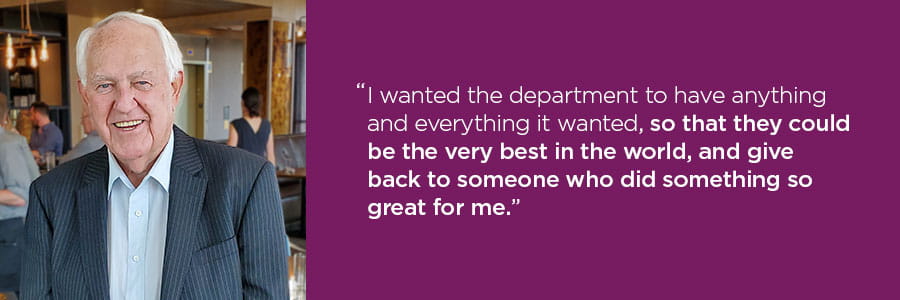Orland Bethel is equally as humble as he is successful, with a philanthropic spirit that matches his altruistic personality.
Born in southeast Ohio and raised on a dairy farm, Mr. Bethel decided to start his own business in 1956. He borrowed $4,000 from his parents and his in-laws and started an egg production and distribution company, Hillandale Farms.
“It began as a real quaint operation,” Mr. Bethel said. “But today, we employ about 1,800 people scattered among 10 states with approximately 19.5 million chickens.”
He credits his many years of accomplishments to “working and associating with good people.” Success, however, whether it be personal or professional, does not always come without bumps in the road.
In 2014, Mr. Bethel began to feel extreme pain in his hips and lower back. He learned that he had a bad case of spinal stenosis, which is the narrowing and squeezing of the nerves and spinal cord, causing pain and other symptoms. He consulted with six different orthopaedic surgeons to see what his treatment options were. However, he did not like the answers he was getting from them.
“Each and every one told me that they would need to cut a chunk of vertebrae out to put rods and mesh in,” Mr. Bethel said. “I heard it was a relatively successful operation, but I also heard about cases where it wasn’t.”
Mr. Bethel kept putting it off in hopes of a less invasive option. At the time, his general manager of the production facilities for Hillandale Farms had a daughter who was attending the University of Pittsburgh School of Medicine. She offered to look into options at UPMC for Mr. Bethel to seek another opinion, which led him to Joon Yung Lee, MD, professor, University of Pittsburgh, associate program director and clinical director of The Ferguson Laboratory, Department of Orthopaedics.
At first, Dr. Lee told Mr. Bethel the same thing as the previous six surgeons – an operation to remove parts of the vertebrae would be the optimal treatment.
“That’s what I’ve been told,” Mr. Bethel said to Dr. Lee. “But that doesn’t sound any good to me.”
Dr. Lee looked over Mr. Bethel’s records and images of his spine one more time and made a proposition. He told Mr. Bethel that if given the opportunity, Dr. Lee believed there was a 10 to 15 percent chance he would be able to do a less invasive procedure. But, Mr. Bethel had to give his consent to continue with the original operation if Dr. Lee found that it was necessary once in surgery.
“It’s the best deal I’d ever heard,” Mr. Bethel said.
He scheduled the surgery, and when he came out of the operation, he learned that Dr. Lee’s plan worked. Mr. Bethel’s nerves in the lower back were chronically compressed from extensive bone spurs that had formed from wear and tear. In addition, he had developed mild scoliosis that potentially made his spine unstable. After carefully removing the bone spurs, the next decision was to determine whether his spine was stable enough to avoid the more extensive fusion procedure. Dr. Lee felt that fusion was not necessary, which turned out to be the right decision.
Some years later, Mr. Bethel came to Dr. Lee with a more serious condition. His shoulder muscles were atrophied and weak, and after some testing, it was determined that his spinal cord in his neck was being compressed. In this case, the situation was more urgent, as further damage to the spinal cord can mean quadriparesis, which can cause a temporary or permanent weakness in all four limbs. Mr. Bethel underwent another operation in his neck to remove compression on his spinal cord, restoring his function to his shoulders.
“I have nothing but tremendous respect for Dr. Lee,” Mr. Bethel said, ultimately deciding to show his appreciation through philanthropic support.
Mr. Bethel made an endowed gift to The Ferguson Laboratory for Orthopaedic and Spine Research in support of Dr. Lee’s work.
The Orland Bethel Professorship in Spine Surgery will support the recruitment, salary, professional development, expenses, and scholarly activities of the faculty member who holds the professorship, as well as spine research and other key academic initiatives in the Department of Orthopaedic Surgery.
“I wanted the department to have anything and everything it wanted, so that they could be the very best in the world,” Mr. Bethel said. “We strategically decided on a gift that would be of the most benefit to them. It will help the department foster what they believe in and allow Dr. Lee to decide, with the consultation of my children, where and how the endowment earnings can best be put to use.”
“The gift from Mr. Bethel and his family is tremendous,” said Dr. Lee. “His generous gift will give us freedom to support projects in our laboratory that previously could not be funded due to the ever-diminishing NIH resources. I am mostly excited about the fact that we can now support undergraduate and graduate projects that were previously difficult to fund. Undergraduate and graduate students in our laboratory represent the next generation of scientists who may give us the most ‘return of investment,’ and educating them will be a lasting legacy for the Bethel family.”
Today, Mr. Bethel lives in Florida with his wife, Dolly, and also has a home in Greensburg, Pennsylvania. His children, Gary, Cynthia, and Susan, are now the owners of Hillandale Farms, but Mr. Bethel is still involved in operations seven days a week – something he is able to do and keep up with thanks, in part, to Dr. Lee.
“I feel like now, at 83 years of age, I can take on the world,” Mr. Bethel said. “I wanted to give back to someone who did something so great for me.”
For more information about how to support the Department of Orthopaedic Surgery, please contact Kraig Smith at skraig@pmhsf.org or 412-647-8462.

















